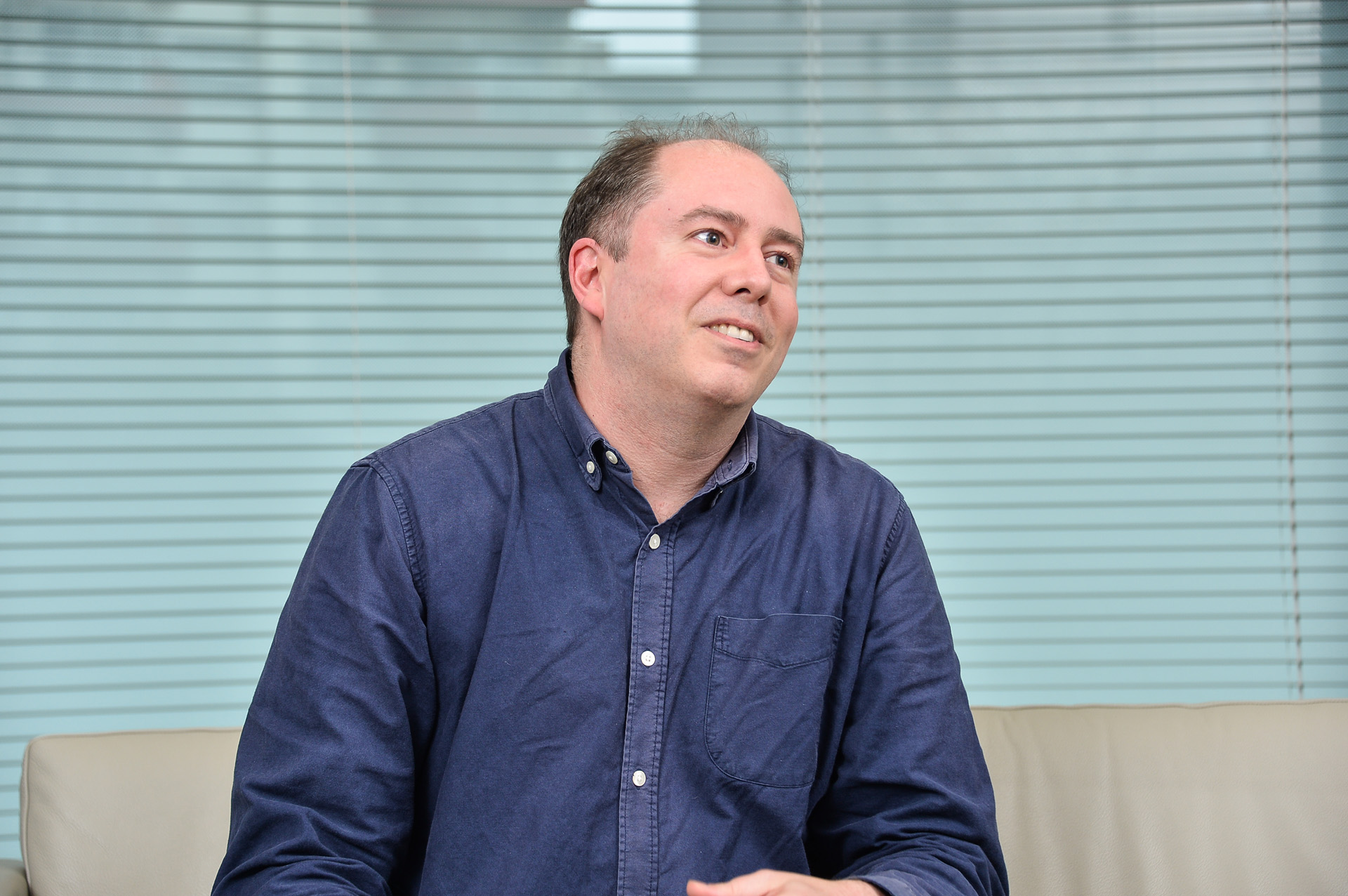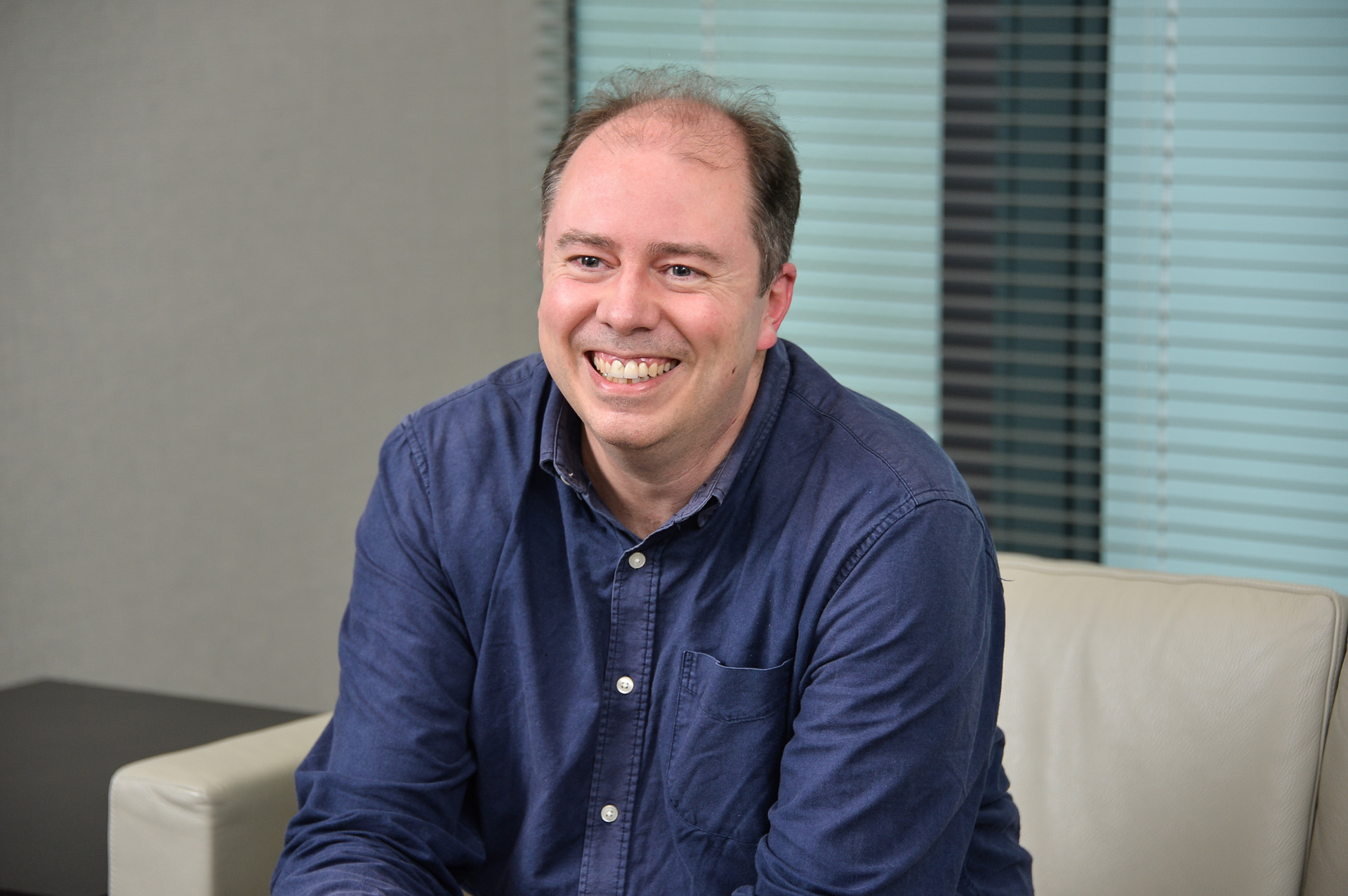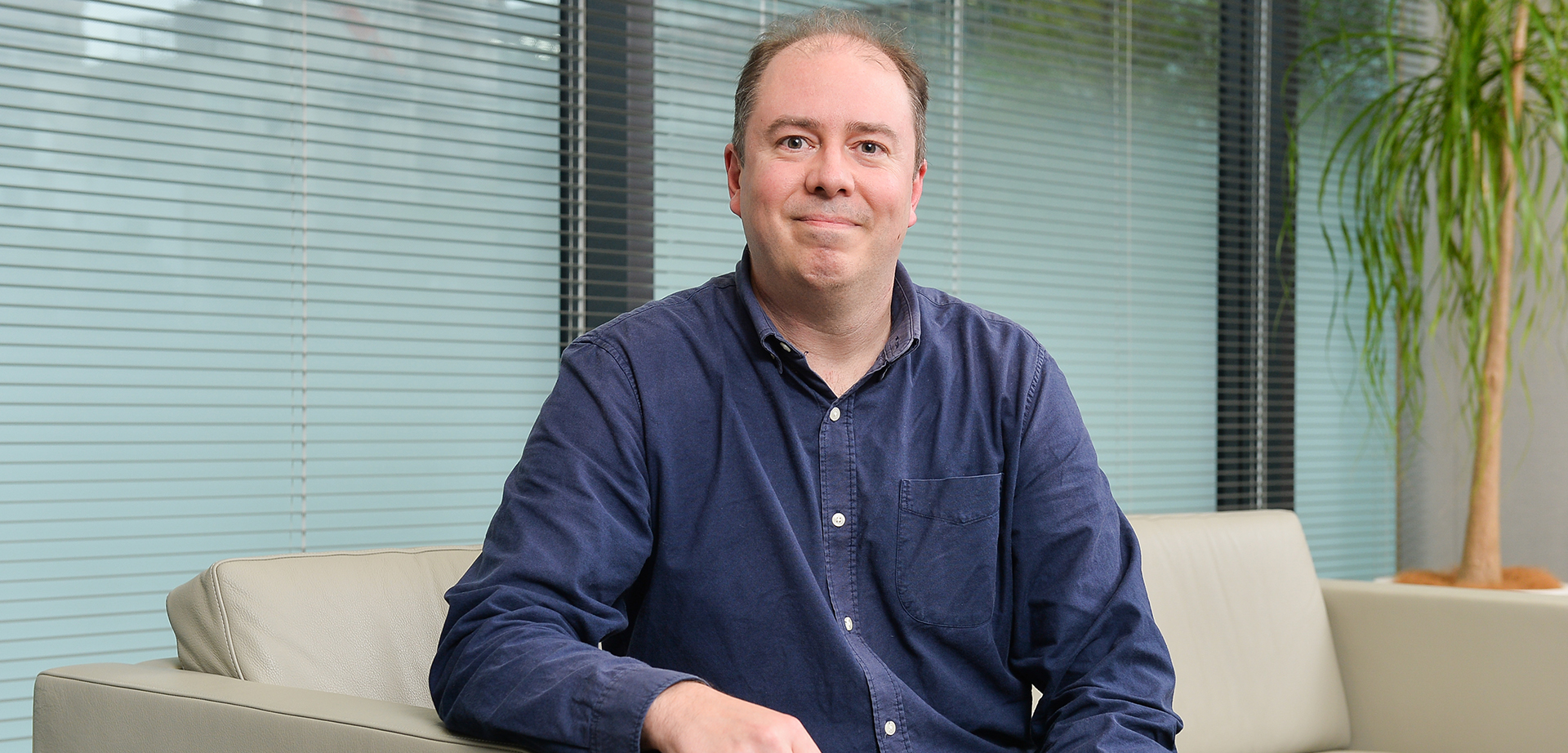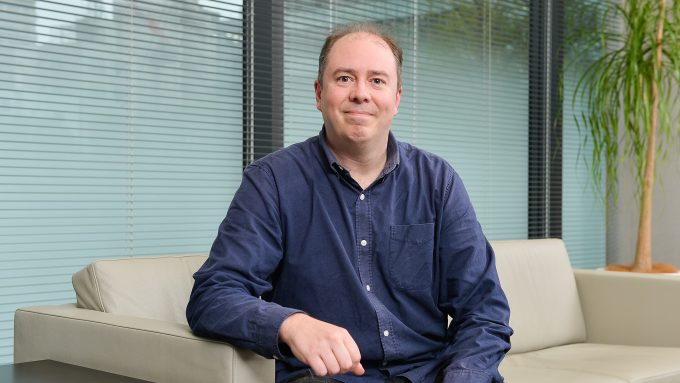WE GREW VANA'DIEL is a series of interviews with those who were involved in the development of FINAL FANTASY XI (FFXI), as well as guests from other companies. In this installment, we interviewed Michael-Christopher Koji Fox (often referred to by his middle name, "Koji") from the Localization team, who worked on English translations for the North American version of FFXI.
As an American who has loved Japan since childhood, how did he come to be involved with FFXI, and what were his thoughts on the past two decades as a member of the Localization team? In this first part, Koji shared how he came to live in Japan and join the company known as Square at the time.

Senior Translator in Square Enix's Localization department. Born in the U.S. in the state of Oregon, he taught English at a junior high school in Japan after receiving his teaching license from Hokkaido University of Education. He later joined the Localization team at Square (now Square Enix) in April 2003, where he has worked on FFXI's English translations for scenario text and item names and is currently (2023) the Localization Director for FFXVI. Koji has also been a drummer in THE STAR ONIONS (a band of FFXI staff members) and is the vocalist and rapper for THE PRIMALS (the official band of FFXIV).
Learning Japanese to play video games
I'd like to start off by asking how you became interested in Japan.
- Koji
I'm from Oregon, but I used to watch this Japanese TV drama in the 80s called "From Oregon with Love"* when I was in America. They probably aired the show on our local TV station because it was set in Oregon. The show had this visual effect where the entire screen faded to white whenever they cut to a commercial, and I was shocked like, "What's going on? Why's it turning white?"
* "From Oregon with Love" is a drama series that aired from October to December 1984.
The series was filmed in Oregon over an extended period. So it wasn't the content of the show, but the whiteout that got your attention. (laughs)
- Koji
That's right.
All the American shows I'd seen had faded to black for as long as I could remember, so it must've seemed new to me. I don't remember the drama at all, but I still remember that visual effect. I was probably about ten years old, and for some reason I thought, "Wow, Japan is amazing!" Was that your first exposure to Japanese content?
- Koji
"From Oregon with Love" was probably the first Japanese thing I was exposed to while aware of its origins. I'd watched "Speed Racer"* and Super Sentai shows (Japanese superhero shows) prior to that, but I wasn't aware they were from Japan.
* "Speed Racer" is an animated television series about automobile racing which aired from April 1967. The series was produced by Tatsunoko Productions and originally aired in Japan under the title "Mach GoGoGo." As for games, what was the first title you played?
- Koji
The first video game console I ever played was the Atari* back when I was in the upper grades of elementary school. Then the NES* was released when I was in sixth grade, and Santa got it for me for Christmas. I remember there was a message that said "Action Set" and it came with Duck Hunt and Super Mario Bros. From there, I got more and more addicted to video games. I bought games with my own pocket money, and of course, I bought the SNES*.
* Atari is a series of video game consoles developed by the American company of the same name.
Notable consoles include the Atari Video Computer System (Atari 2600) and the Atari 5200.
* The Nintendo Entertainment System (NES) is a video game console released in North America in 1985 and Europe in 1986. The NES is a redesigned international version of the Family Computer (Famicom) released in Japan in 1983.
* The Super Nintendo Entertainment System (SNES) is a video game console released in North America in 1991. The SNES was released in Japan as the Super Famicom. Did your love of games influence your career decisions later on?
- Koji
It did.
By the time I was in high school and thinking about my future, I wanted to work with video games, which I'd always played and loved. Another influence I had was the programming class I took in high school where I learned BASIC. One day, we were assigned with making a game in groups of four, and my group ended up working on a game about going to Las Vegas. That sounds like quite the pragmatic idea for a project!
- Koji
When we got around to making the game, the other three members made minigames for roulette, blackjack, and poker. As for me, I made a minigame involving stealing when the player ran out of money. If the player pressed the spacebar at the right timing, they'd succeed and be able to keep playing, but failing meant they were arrested by the police, and it was game over.
The graphics also turned out nicely, so I submitted the game thinking I'd get an A. But I ended up with a B-, which made me think I wasn't good at programming. I reckoned only programmers could get into the game industry, so that's where I gave up on my dream of working on games, at least at the time. Back then, game planners weren't a specialized profession and programmers handled everything.
So from there, how did you end up in Japan?- Koji
Aside from video games, I was also interested in learning languages. I studied French in junior high for three years, and during my first year of high school, I even went to a local university to study French. The following year, however, that university stopped offering French classes. I wanted to continue my studies and asked my father if I could take French classes at another bigger university in our area, but he turned me down because it was too expensive. So that's when I became interested in learning...
Japanese.
- Koji
That's right.
The NES came from Japan, and many games were also created there. I thought that if I learned Japanese, I could play Japanese games ahead of everyone and boast about it to my peers.

Which games did you play?
- Koji
Back then, import stores had these magazines that listed Japanese distributors who were able to ship overseas, so if you sent a letter and a check to those addresses, their games would arrive a few months later.
* The Legend of Zelda: Ocarina of Time is an action-adventure game released in 1998 for the Nintendo 64. It was the first entry in The Legend of Zelda series with 3D graphics and introduced a number of gameplay innovations.
One of the games I got was The Legend of Zelda: Ocarina of Time*. Although I was eager to play, I had no idea where to go next without understanding Japanese. I really wanted to finish Ocarina of Time, so that became a reason for me to study Japanese very seriously.
Learning Japanese through video games wasn't necessarily a bad thing, but my knowledge was biased towards game terminology; for example, I couldn't even write basic kanji characters, but I could write the kanji character for "axe" for some reason. (laughs) It must've been hard when you first started studying Japanese.
- Koji
Many people probably give up when they stumble into kanji characters, but I liked studying languages, so I was able to stick with it while having fun.
Becoming an English teacher in Japan
When did you first visit Japan?
- Koji
When I graduated from high school, my father offered to pay for me to travel abroad as a gift, so I chose to go to Japan. In the U.S., the school year ends in June and begins in September, so I spent about a month of my summer as a homestay student in four different cities: Yoshikawa in Saitama Prefecture, Nyuzen in Toyama Prefecture, Sekigahara in Gifu Prefecture, and Hiji in Oita Prefecture.
Wow, you stayed in a lot of different places.
- Koji
Each city had an exchange program hosted by a teacher from a local junior high school, and I got to meet with Japanese junior high students. As I watched those teachers teaching English in class, I grew interested in pursuing a teaching career myself, and decided to become a teacher in Japan.
As an American, one of my options was to become an assistant language teacher, but I was more interested in becoming a full-fledged teacher for Japanese students. There weren't many instances of non-Japanese people around me who became teachers in Japan, and I didn't know what to do, but I was determined to do it and continued my Japanese studies in college. Then after about two years, I left college in the U.S. and moved to Nagasaki to study for the National Center Test for University Admissions to get into a Japanese university. Ah, that's what we call the Common University Entrance Test nowadays.
- Koji
I figured my first attempt would end in failure since I'd only studied in Japan for about half a year. After all, the questions were all written in Japanese, not to mention the U.S. and Japan teach different spectrums of world history; specifically, you learn about European history in the U.S., but not so much about Chinese history, which makes up almost half of the world history taught in Japan.
And of course, there were kanji characters all over the test. (laughs) Because of that, I figured, "It's not a big deal if I fail this time, I'll study hard for another year and try again," but I ended up passing! The three subjects were world history, math, and English, and since I probably got a perfect score in English that probably helped push me just barely over the threshold. English is your native language, after all.
- Koji
But even if you pass the Center Test, there was still the university entrance exam waiting for me. Not only did I have to take a test, but also write a paper, and appear in an interview. I wasn't expecting to pass the Center Test in the first place, so I wasn't really prepared for all of that. But I passed again and made it into university.
It must've been all the hard work you put in.
- Koji
From there I attended Hokkaido University of Education for four years and obtained my teaching license. Then I took the teacher employment exam, which is extremely difficult to pass, and I thought, "There's no way I'm going to pass if even Japanese people have a hard time," but then I passed again! (laughs)
In fact, I was apparently the first American ever to pass the teacher employment exam in Hokkaido. After that, I was assigned to a junior high school in Hakodate where I was an assistant teacher for about two years, and in my third year I became a homeroom teacher. When I visited families for parent-teacher conferences, everyone was surprised to see a foreigner show up at their home. (laughs)

You're incredibly fluent now, but how was your Japanese when you first moved to Japan?
- Koji
Before I moved, I could speak some Japanese and I also loved kanji characters, so I was able to read and write them. However, I hadn't had many opportunities to use Japanese in my everyday life. I had many Japanese friends in the U.S., but they were there to study English, so I didn't really get to practice my Japanese with them.
I see, so you didn't start using Japanese in your everyday life until you moved to Japan.
- Koji
That's right.
Incidentally, the Hokkaido University of Education had about five branch campuses throughout Hokkaido, and I enrolled in the Hakodate branch to put myself in a Japanese-only environment. There were plenty of foreigners in the urban areas, so it wasn't uncommon for stores and facilities to have staff who could speak English.
And even within Hokkaido, for example, if I chose to go to Sapporo, I would've gone to the entertainment district and not have studied at all, so I wanted somewhere that was more rural. (laughs) That's how I ended up choosing Hakodate, and I rarely had interactions with other foreigners during my time in university, so you could say I was immersed in Japanese for those four years.
Even after I became a teacher, there were only Japanese people around me, so I never used English outside of the classroom. That meant I practically spent seven years without using English in my everyday life, which I'd say helped my Japanese skills considerably. So you ended up teaching English after all.
- Koji
That's right. I was also the advisor of the basketball club.
It must've been hard to be a homeroom teacher at a junior high school, considering how kids are going through puberty at that age.
- Koji
It certainly was, not to mention I was teaching the second-year students, who were the rowdiest, as opposed to the first-years who were still innocent, or the third-years who were studying for their high school entrance exams. But I loved teaching, so it was a lot of fun; on the other hand, it was also very stressful.
Could you elaborate?
- Koji
The curriculum has certain rules set by the Japanese Ministry of Education, so even if you disagreed with the English they taught in Japan, you still had to teach according to those rules. If you want to change the rules, you must join the Ministry of Education, and doing so would mean you couldn't be a teacher anymore.
I still wanted to continue teaching despite my feelings about the system. But I had various conflicts on my mind, stemming from my advisory role for the basketball club and friction with other teachers. In the midst of all that stress, one relief I had at home was playing video games, as I'd always loved to do since childhood. Even as an adult, video games were still as fun as ever.
I wanted to play the FFXI beta test, no matter what.
So video games helped with your mental health at the time.
- Koji
Back then, I must've been playing either FFX or FFX-2. The setting of those games wasn't exactly what I wanted since I was more of a fan of high fantasy. So I was curious what the next game in the series would be like, and was really excited to find out that FFXI was going to be an MMORPG with a high fantasy setting.
I'd never played online games before but playing with other people sounded like a lot of fun. The idea of being able to play with people from all over the world while living in Japan really set my imagination on fire. Sounds like you had the same expectations for FFXI that many gamers had at the time.
- Koji
Yes, I did.
I thought, "I have to play this no matter what," and I immediately applied for the beta test. That said, I figured the odds were too high for me to be selected anyway, so I didn't buy the PlayStation BB Unit that was apparently required to play. But then I ended up getting selected for the beta, and the metal binder containing the manual was delivered to my house in a fancy black box. So you got in yet again. (laughs)
- Koji
I was eager to play immediately since I was selected, but of course, I didn't have a BB Unit. Even when I rushed to the Sony Computer Entertainment (now Sony Interactive Entertainment) website, it was listed as "SOLD OUT." Through trial and error, I eventually got ahold of a BB Unit, and after upgrading my home internet from dial-up to ADSL, I finally had the environment to play FFXI. Naturally, once I installed FFXI and started playing, I became obsessed.
There certainly were a lot of obstacles to overcome to play FFXI back then.
Did you go straight from the beta version to the full version?- Koji
Of course, I also played the full version of FFXI every night. It was around that time that I quit my teaching job for real-life reasons, and as I was wondering what to do next, I stumbled across a recruitment ad for Square's Localization team. I had no knowledge of localization at the time, but I figured I could handle translations since I spoke English, graduated from a Japanese university, and had teaching experience. And since I liked Square's games, I casually decided to apply.
Sounds like it was a turning point in your life.
- Koji
The application process included a localization assignment, which was to write a story of roughly 1,000 words featuring characters from previous FF games. My story was about Shadow from FFVI, and how he gets spirited away to Harajuku (a district known for Japanese youth culture and fashion) and mistakes a darkly tanned girl for an Amazon. I figured I wouldn't be picked with that kind of story, but… I ended up being accepted. (laughs)
That seems to happen to you all the time! (laughs)
- Koji
I was then called to Square's headquarters, which was in Meguro at the time, for further testing and an interview. That was the first time I did translation work. The test involved translating conversations, item descriptions, and terminology from Parasite Eve and past FF titles, and I remember looking words up in a dictionary as I translated. Aptitude tests like that are done remotely through computers nowadays, but back then, everything was handwritten.
What did they ask you during the interview?
- Koji
They asked me if there were any games I was currently playing, and I immediately answered, "FFXI!" As it turned out, they happened to be looking for a translator for FFXI. Since I played FFXI, had lived in Japan for a while, graduated from a Japanese university, and could speak both Japanese and English, they must've thought, "We could put this guy to work immediately." Moreover, one of the people interviewing me was leading the translation of FFXI. During the interview, I'd emphasized just how much I liked FFXI, so perhaps they thought I was a good pick.
Part 2 will be available on January 18, 2023.




